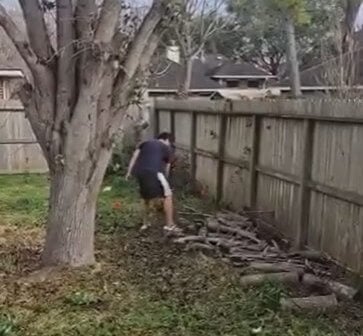On the Front Lines: Chaining Ordinances Work
The statements below were made by officials who work in jurisdictions where tethering restrictions or bans have been passed, and they are likely to encourage your local officials to follow suit! Please ask your representatives to read these reports and consider how a chaining law would benefit your community.
Why Were These Laws Created and Passed?
“Wichita, Kansas, in its effort to address aggression, cruel treatment, and neglect issues, passed tethering restrictions ….”
—Dennis Graves, animal control supervisor, Wichita, Kansas
“Over the years, the Washington Humane Society has gained a firsthand knowledge of the problems which the chaining or tethering of dogs cause. … Eventually the dog will break the chain and will escape the yard. Bite cases come in regularly where a dog has broken or got off [the] chain and has bitten someone while running loose. Chaining also creates a hazard for dogs, because they can become tangled and/or hang themselves.”
—Adam Parascandola, former director of humane law enforcement for the Washington Humane Society, Washington, D.C.
“The ordinance was originally passed because putting an animal on a [tether] was deemed cruel for a variety of reasons. … [W]e had seen a number of instances where animals [who] had been [tethered] wound up choking themselves when they tried to escape by jumping over items in the yard, such as cars or motorcycles.”
—Pat Mehrhoff, senior assistant prosecuting attorney, Tucson, Arizona
“We [passed] this ordinance for two main reasons: (1) the safety of our citizens and (2) for the humane treatment of the animals. On the issue of safety, our records indicated that 51 percent of our dog bites were from dogs [who] were confined on chains or had been chained and had broken loose. … I observed that most of our dogs [who] were chained were receiving inhumane treatment.”
—Elaine Modlin, animal control officer, Laurinburg, North Carolina
Can These Laws Be Enforced to Help Communities and Their Dogs?
“[T]he … amendment to the District of Columbia anti-cruelty law, which targets the chaining of dogs … has given the WHS Humane Law Enforcement Division an excellent tool in improving the lives of dogs in the District of Columbia. . . . [T]he anti-chaining law … makes for safer neighborhoods and happier dogs, all without adding burden to our enforcement division. Passing this law has reduced our workload rather than [increasing] it.”
—Adam Parascandola, former director of humane law enforcement for the Washington Humane Society, Washington, D.C.
“Wichita’s ordinance … has been a very useful tool in our efforts to improve the lives of the dogs in our city. … This is a welcome and enforceable tool for the animal control section I oversee. … This ordinance has made it possible for our officers to educate pet owners about the importance of interacting with their pets, proper activity, and exercise. It has also given us the ability and ‘the teeth’ to prosecute those individuals that refuse to comply.”
—Dennis Graves, animal control supervisor, Wichita, Kansas
“In terms of prosecution, we have found this to be a fairly enforceable ordinance which usually results in convictions.”
—Pat Mehrhoff, senior assistant prosecuting attorney, Tucson, Arizona
Do Officials With Experience Enforcing Chaining Ordinances Recommend Them?
“I highly recommend that other jurisdictions consider passing similar ordinances if they have issues with animal neglect, continuous chaining, and illegal dog fighting. Our ordinance has served us well.”
—Dennis Graves, animal control supervisor, Wichita, Kansas
“I encourage any city or county (hopefully states someday) to [pass] a similar … ordinance to improve the lives of dogs and protect their citizens.”
—Elaine Modlin, animal control officer, Laurinburg, North Carolina
“[W]e are strong proponents of the anti-chaining law and feel it has been a success here in the nation’s capital.”
—Adam Parascandola, former director of humane law enforcement for the Washington Humane Society, Washington, D.C.
Please invite your legislators to review these convincing notes of support and think about how a tethering ordinance would make your area safer for everyone!









